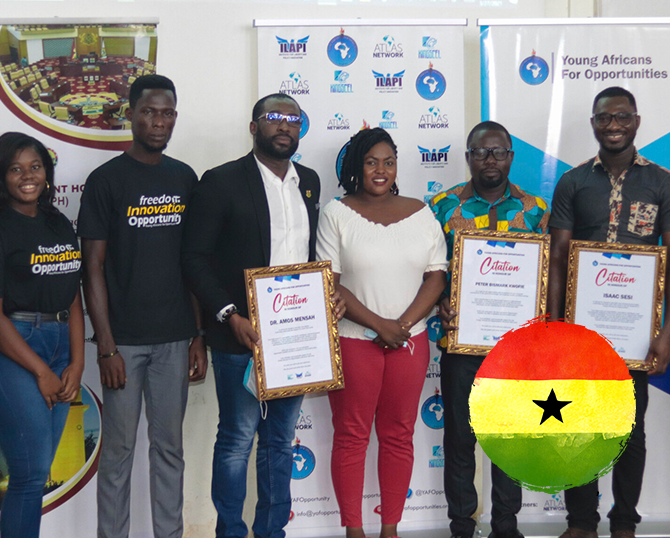
Severe unemployment in Africa has made many people willing to listen to politicians who promise them government jobs if they are elected. This has increased government dependency among the younger generation in Africa—especially in Ghana—and threatened the hopes of many young Africans. Young Africans for Opportunities works to inspire hope among young Africans by igniting creative problem-solving and entrepreneurship and avoiding over-dependency on political elites.
A first step toward this goal was achieved with the Opportunity Summit at the Kwame Nkrumah University of Science and Technology (KNUST) in Ghana. Opportunity Summit sought to create a forum to discuss evidence-backed free-market solutions and present a freedom-focused perspective on issues facing young Africans. This year’s Opportunity Summit was centered on building the capacity of young Africans through presentations from speakers on enabling them to contribute to society. The Opportunity Summit had the theme Job Creation Opportunities, Developing Assets, and Conscious Resources for Life after School.
Chaired by Professor Kwadwo Afriyie—lecturer at KNUST—the summit highlighted value creation as a way to use talent to solve social problems and create a prosperous future for Africa. Opportunity Summit featured Dr. Amos Mensah; Peter Bismark Kwofie, executive director of the Institute for Liberty and Policy Innovation in Ghana; and Isaac Sesi, CEO of Sesi Technologies, as the three key presenters.
The purpose of the summit was to inspire entrepreneurship and reduce reliance on government for jobs among young people in Ghana.
Dr. Mensah commenced by linking academic expectations to the realities of life after school. His presentation revealed that graduate unemployment is high in Ghana because meritocracy has been ignored in the society. Growing cronyism, favoritism, and nepotism are the reasons for the increasing rate of graduate unemployment in Ghana, he said. He also admonished that although there is a lack of employment opportunities in the struggling economy, students and young individuals should build a competing advantage by acquiring both hard and soft skills.
“It is not enough to have just the technical knowledge. Work on the practical aspect as well. Undertake internships. If it is difficult to get a place for an internship, vary your approach. Tell them you don’t need the money but rather an opportunity to learn practical knowledge. You will get opportunities to learn,” said Dr. Mensah.
Kwofie shared the philosophy of job creation with participants. He emphasized that job opportunities abound in countries with economic freedom. Government job-creation programs are focused on winning votes. He concluded that the private sector should drive job creation for wealth creation while the government should play the role of providing security by protecting private property and rights.
Sesi shared with participants how his entrepreneurial journey began and how he overcame challenges along the way. He mentioned that a problem-solving attitude helped him in his journey and can help solve problems in society. He talked about his realization that smallholder grain farmers lose up to 30% of their grains and their potential income as a result of post-harvest losses. The main causes include poor drying, the high moisture content in grains, and poor storage, all of which lead to spoilage. Sesi Technologies met this challenge and helped farmers through their GrainMate invention.
“For you to build up yourself very well, you have to discover your passion, build your skills, and be the best at something. Gain experience, build your network, tell your story, and market yourself,” said Sesi.
About 341 participants benefited from the three-hour 2021 Opportunity Summit, which was held at the School of Medicine and Dentistry Lecture Theatre at KNUST in Ghana. Participants also received reading materials on the ideas of a free society.
“I have learned a lot. The second speaker made me realize that I have employed the government with my vote, but they have little incentive to create jobs for me,” said Asamoah Kwaku, a summit attendee.
The COVID-19 pandemic showed the power of government to control every aspect of individual lives. The unforeseen consequences of the lockdown and the government declaring economic activities essential or non-essential helped people realize the value of freedom and innovation and the need to keep the torch of liberty shining in the face of adversity. Though the pandemic disrupted the planning of Opportunity Summit, it was still a success and participants were glad to have been part of it.
The Opportunity Summit event was organized by Young Africans for Opportunities in collaboration with KNUST Students’ Parliament House, College of Humanities and Social Science, and the International Association of Students in Agricultural and Related Sciences with support from Atlas Network, Kingscel Technologies, and the Institute for Liberty and Policy Innovation.
Nathaniel Dwamena has bachelor of arts in geography and rural development and is the co-founder and programs manager at Young Africans for Opportunities (YAFO). He is a graduate of Atlas Leadership Academy and a researcher at the Institute for Liberty and Policy Innovation (ILAPI).